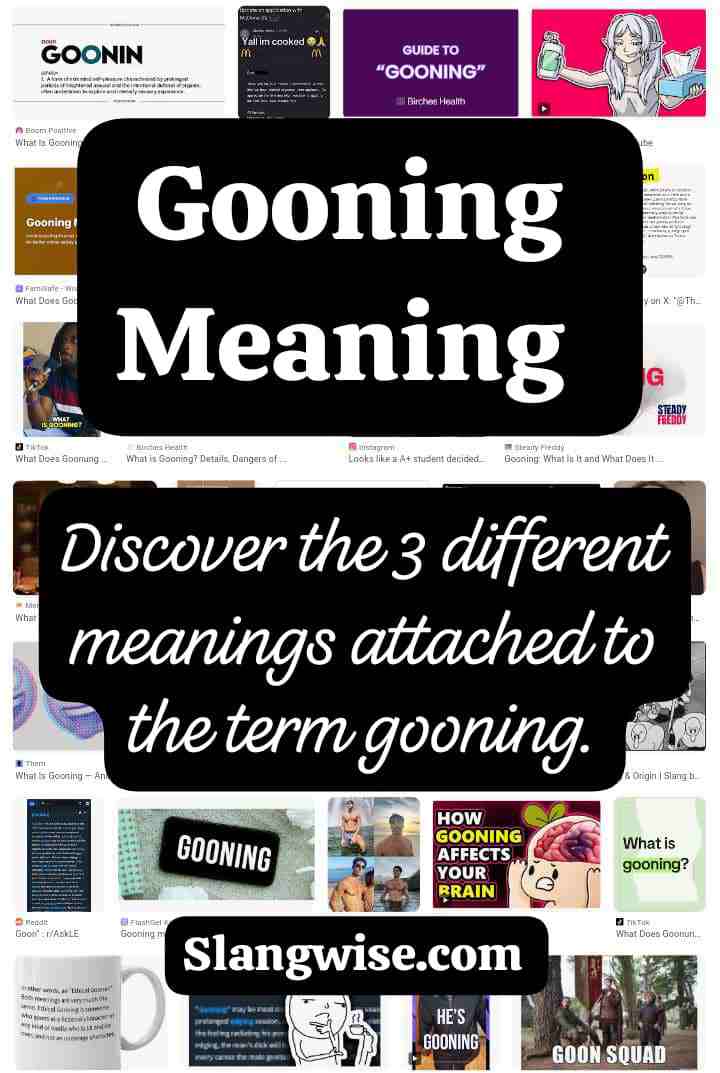Slang words changes fast. A single word can mean very different things depending on who says it and where it shows up online. Gooning is one of those words: in some places it’s playful and harmless, and in others it refers to a very specific, adult practice.
This post explains the main uses, how to tell them apart, and how to use the word safely.
Table of Contents
In a Nutshell
- Gooning can simply mean goofing off or being silly, the everyday, harmless use.
- In certain internet subcultures, gooning names a prolonged, trance-like masturbation practice.
- The word’s root, goon, historically means a foolish person – that helps explain the “silly” angle.
- Read the room: platform and context decide whether the word is safe to use.
SlangWise Thought: Gooning proves slang can carry wildly different meanings across communities – context is the interpreter.”
Short, plain gooning meanings
There are three common senses of gooning today:
- A playful sense: acting silly, clowning, or messing around (think “goofing off”).
- A sexual, niche sense: prolonged, trance-like masturbation often discussed in certain online communities.
- A meme/obsessive sense: jokingly saying someone is overly obsessed with something (“gooning over that new song”).
All three are legitimate uses. Which one applies depends on context and audience.
Where the harmless gooning meaning comes from
The harmless meaning according yo Merriam-Webster ties back to the older word goon, which has meant a foolish or clumsy person for a long time. That usage shows up in standard dictionaries and explains why people say someone is “gooning around” when they’re just being goofy or awkward.
If the conversation is about school, friends, or goofing off, it’s safe to assume this is the sense in play.
The niche, adult meaning – what to watch for
In certain online corners: Reddit, fetish forums, Discord servers and some explainers in mainstream outlets, gooning has a much more specific meaning.
It describes a prolonged session of self-stimulation where the person intentionally delays orgasm to reach a trance-like state.
As one sex expert explained, “Gooners often enter a trancelike state, referred to as the ‘goon state’, from being so close to climax and then pulling back right before they cum.”
That use is explicitly sexual and generally considered NSFW. It also tends to appear inside communities that treat it as a kink or a lifestyle choice.
Because the meaning is so different from the everyday sense, misunderstanding can be awkward or embarrassing.
Read Also – 50 Most Popular Gen Z Slang Words of 2025.
The meme-ified sense: joking obsession
A third shade of the word is lighter and nonsexual: people use gooning to say they’re deeply into something, often with a wink. “He’s gooning over that new track” simply means he’s obsessing in a funny way.
This playful exaggeration helps explain how the term spread from niche spaces into general meme culture.
How to tell which sense is meant
A few quick checks help avoid mistakes:
- Platform matters. Public social posts and casual chats usually use the playful or meme sense. Private fetish forums or certain subreddits are likelier to mean the sexual sense.
- Look for clues. Sexual words, suggestive emojis, or porn references point to the adult meaning. If conversation is about jokes, music, games, or school, the harmless meaning is more likely.
- When in doubt, don’t assume. If clarity matters, ask in a neutral way (for example: “Do you mean goofing off or something else?”). That saves headaches.
Gooners often enter a trancelike state, referred to as the ‘goon state’, from being so close to climax and then pulling back right before they cum. — Zachary Zane, sex and relationships expert.
That sums up why treating the word carefully is smart advice.
Why words split like this
Online communities accelerate meaning changes. A term can start in one subculture, pick up a new shade there, and then spread out with both old and new meanings intact.
Gooning moved from a colloquial “foolish” root into specialized sexual subcultures, and then into meme culture, so all three versions now circulate together. This pattern is normal for slang: words adapt to the groups that use them.
How to use gooning safely
- Use the playful sense only with friends or in clearly informal settings.
- Avoid the word in work emails, classwork, or any public content where someone might read the adult meaning into it.
- If writing for a broad audience, explain the sense you mean or swap in a safer synonym like “goofing off” or “obsessing over.”
- If managing a brand or blog, avoid ambiguous slang that could be misread; clarity protects reputation.
Note on safety and health: commentators and health writers have flagged potential risks when any behavior becomes compulsive; if prolonged sexual behavior seems disruptive to life or relationships, consult a qualified professional.
Find out: The Misheard Slang Phrases: 8 Slang Terms We Got Wrong, and How They Stuck Anyway. Discover the linguistic mix-ups that became slang staples.
Final thoughts
Words are living things. Gooning shows how a short, punchy term can mean very different things in different places. The best tool is simple: read the room, watch for context clues, and pick clarity over cleverness when the audience is mixed.
For anyone who writes about slang or moderates online spaces, that rule keeps conversations clear and avoids accidental shock.
If that little guide helped, consider saving it for reference when an unfamiliar slang term shows up – context will almost always tell the story.

